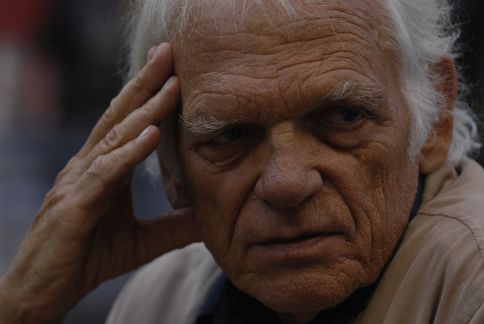
Erasmus Schöfer
- Germany
- Zu Gast beim ilb: 2009
Erasmus Schöfer was born in Altlandsberg in 1931 and grew up in Berlin. At university he studied German, linguistics and philosophy. In 1960 he completed his doctorate on »Die Sprache Heideggers « (Heidegger’s Language) at Bonn University. He initially worked in the academic field, but from 1962 onwards he dedicated himself to writing and has been a free-lance author since that time. He has lived and worked in Cologne, Freiburg, Munich, Neuss, Paris, and on the Greek islands Patmos and Ithaca.
In 1970, he co-founded the »Werkkreis Literatur der Arbeitswelt« (Literature of the World of Work), was chief editor for several years and published various volumes in the eponymous paperback book series published by Fischer. He was also attracted to the theatre – he wrote plays such as »Die Bürger von Weiler. Ein optimistisches Trauerspiel« (1978, t: The citizens of Weiler. An optimistic tragedy) and co-founded the industrial theatre »Der Wahre Anton« (t: The real Anton). In addition, he wrote various radio plays and scripts for broadcasters in Germany and abroad. He published his first novel, »Tod in Athen« (1986, t: Death in Athens) in the 1980s.
Schöfer’s work is characterized by the authentic portrayal of events and the use of a variety of innovative styles which give his books a unique aesthetic. It is a technique he has perfected during his career, culminating in his major work, the cycle »Die Kinder von Sisyphos« (t: The children of Sisyphus). The works in this quartet of novels, consisting of »Ein Frühling irrer Hoffnung« (2001, t: A spring of mad hope), »Zwielicht« (2004, t: Twilight), »Sonnenflucht« (2005, t: Flight of the Sun) and »Winterdämmerung« (2008, t: Winter Dawn), echo those of authors such as Uwe Johnson and Peter Weiss. Schöfer creates a multifaceted panorama of the political and social developments in West Germany between 1969 and 1989. Without losing sight of the European dimension of his subject, he recounts events such as the protests of 1968, the people’s movement against colossal technical projects, employment bans, workers’ strikes and love in the pill era. The plot is constructed out of the intertwined life stories of a workers’ activist, a journalist, a history enthusiast and his wife. These parallel first-person narrative strands are interspersed with montage-like reports, diary entries, letters and similar texts. Schöfer succeeds in creating an exceedingly »realistic and authentic picture of these German decades« (FAZ). Ilija Trojanow recently described Schöfer as a »wonderful author«.
Erasmus Schöfer has been awarded many literary prizes, including the ARD Kurt-Magnus Prize, scholarships awarded by the German Literature Foundation and, most recently, the Gustav-Regler Prize. The author lives in Cologne.
© international literaturefestival berlin
Die Bürger von Weiler
Verlag der Autoren
Frankfurt/Main, 1978
Tod in Athen
Weltkreis
Dortmund, 1986
Ein Frühling irrer Hoffnung
Dittrich
Berlin, 2001
Zwielicht
Dittrich
Berlin, 2004
Sonnenflucht
Dittrich
Berlin, 2005
Winterdämmerung
Dittrich
Berlin, 2009
